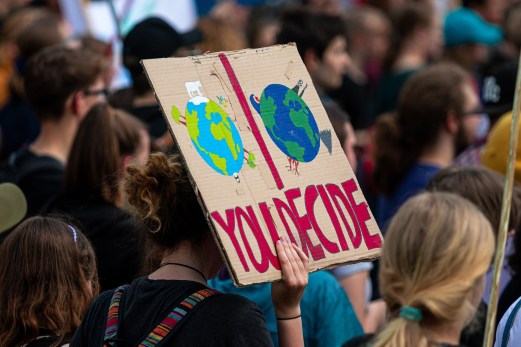We need an action-based climate change curriculum now!
Paul Thompson, Head of Geography at Sevenoaks School asks what it would take to put environmental sustainability at the heart of education.
Sustainability in the curricukum: where is it now?
A scholarly definition of environmental sustainability refers to a state of balance, resilience, and interconnection, which allows human society to meet its requirements without causing harm to the ecosystems and biodiversity (Morelli, 2011; Rafiq et al., 2022).
The extent to which an understanding of ‘sustainability’ features in major curriculums is not well understood. In the upper secondary years (14–19) it is likely that assessed content featured on examination specifications is prioritised over sustainability. In England, the environment features in the national curriculum for design and technology, geography and the sciences (with no references to sustainability). However, in a recent review of environmental education policy in England, Glackin and King (2020) found that there was limited attention given to education for the environment in national educational policy and assessment specifications.
Teacher perspective
Despite minimal treatment of the environment and sustainability in curriculum and assessment, a recent survey by Howard-Jones et al. (2021) found that most teachers in England supported the implementation of an action-based climate change curriculum, including issues of global social justice. Current education for environmental sustainability across the UK is not adequate and should not be limited to science and geography lessons. Amongst teachers, there is broad agreement that students should be taught about climate change, its implications for environments and societies around the world and how to address them (YouGov, 2019 quoted in Dunlop et al 2022).
Youth perspecive
Contemporary national and international youth movements such as Teach the Future and Fridays for Future have also drawn attention to the inadequacies of current education in the face of the current, real, climate crisis. #FridaysforFuture has seen over 1.6 million young people taking part in climate strikes across the world (Fisher, 2019 quoted in Dunlop et al 2022) asking ‘why should we spend the time and effort on an education, when our governments are not listening to the finest scientists?’.
Education: failing humanity?
Fazey et al. (2020) have argued that formalized knowledge systems (including education systems) are currently failing humanity in the context of climate change. As the United Nations Economic Commission for Europe (UN, 2012, p. 6 quoted in Dunlop et al 2022) has observed: Education often contributes to unsustainable living. This can happen through a lack of opportunity for learners to question their own lifestyles and the systems and structures that promote those lifestyles. It also happens through reproducing unsustainable models and practices.

Three ways to move forward
How can education which supports or enables environmental sustainability find its proper place in our schools? There are three ways to do this:
- Manifesto making
- Working with charities
- Campaigning.
Manifesto making
The British Educational Research Journal or BERA (2022) describes how teachers and young people from across the UK collaborated to create a manifesto for education for environmental sustainability. Given the urgency of the climate crisis, they argue for interrupting the status quo in education and articulating the role education can play. It is important to involve all participants in the educational process – teachers, young people and teacher educators – while considering the environmental conditions of the near future.
The BERA research identified eight priorities for change to achieve education for environmental sustainability at different levels: in the classroom, in school, in the community and in policy:
- Provide students with the space and time to learn about climate change and environmental sustainability that is not linked to assessment.
- Encourage students to research and take action.
- Resource teachers of all subjects to engage in sustainability-focused professional development.
- Use more sustainable resources and practices in the classroom.
- Identify ways to feature sustainability in school-level decision-making bodies and policies such as in all purchasing decisions, making the sustainable choice the convenient choice in school; greening the school environment; placing student voice and agency at the core of school sustainability action.
- Create a no-cost, external, accredited award. Develop a community sustainability network and curriculum; Value schools as local hubs for sustainability; Start young and keep going!
- Initiate a co-ordinated review, involving teachers and students, of secondary school curricula; Incorporate sustainability intoexisting accountability regimes and policies; Enlist the endorsement of public figures (politicians, social media influencers).
- Create educational policies which focus on valuing collective, equitable action and positive problem solving.
Working with charities
The Ministry of Eco Education is a great example of a charity making a difference to placing sustainability at the heart of the curriculum. It has pulled together the best free sustainability resources and created a series of lessons which are framed around the big societal questions and help teachers to explore how they can embed sustainability across their subject. It has also produced a five-step whole school journey, which curates the wealth of opportunities from third party organisations. It provides staff training which introduces fundamental ideas associated with the climate crisis.
Work with campaigers
Being aware of and supporting campaigning organisations like Teach the Future can radicalise efforts to bring sustainability to the heart of what we teach. Following the publication of the Department for Education’s (DfE) Sustainability and Climate Change strategy in April 2022, Teach the Future has expressed the following priorities:
- Review and revise DfE’s Sustainability and Climate Change strategy so that it includes measurable targets and provides sufficient funding to deliver it.
- Pass a Climate Education Bill in parliament (A private members bill was introduced in January 2022 and is currently under review)
- Include the concepts of ‘climate emergency’ and ‘ecological crisis’ in teacher training and a new professional teaching qualification.
- Ensure that climate and ecological emergency is a compulsory part of all teaching education courses, from primary upwards, for both new and existing teachers through continued professional development.
- Make substantial investment for the retrofitting of existing educational buildings.
Conclusions

1. Review policy
Putting environmental sustainability at the heart of education starts with reviewing policies which
- Enable or inhibit schools from acting in more sustainable way
- Hold teachers and schools to account, e.g., curriculum, assessment and inspection frameworks.
This is urgent. In the UK, whilst a new model science curriculum is proposed, there are no clear intentions to include sustainability across the curriculum and no efforts to include teachers and young people in the design of the curriculum. References to awarding bodies are also absent.
2. Develop students as participative citizens
Recognising the role of politics in environmental education and how education prepares young people to participate in politics, is an important feature of educational responses to the climate crisis. For example, students must develop understanding of democratic politics as a way of handling problems associated with environmental sustainability. At present they are encouraged to think as individuals rather than as citizens (Malmberg & Urbas, 2020 quoted in Dunlop et al 2022).
3. Undertake a subject review
All subjects should be reviewed: Mathematics, Economics, Business Studies and Modern Foreign Languages urgently require this level of attention. Ultimately, the national curriculum must change because its current iteration is outdated.
4. Use a holistic approach
Environmental sustainability is one priority for education, and this cannot be separated from other societal challenges including racism, unemployment and health and wellbeing. We should not see these as in competition, but as a constellation of priorities which demand our urgent and collective attention. Education needs to play a more visible and active role in preparing young people as individuals, and as a collective. This is consistent with young people, teachers’ and teacher educators’ understanding of environmental sustainability as a process of both caring about and repairing environmental and social injustices.
 Paul Thompson, Head of Geography at Sevenoaks School
Paul Thompson, Head of Geography at Sevenoaks School
The full article can be read in the fifth edition of Sevenoaks School’s academic journal Innovate
Further reading from Teach the Future:
FEATURE IMAGE: by Eyoel Kahssay on Unsplash
Support Images: by Dominic Wunderlich from Pixabay & by Aziz Acharki on Unsplash

